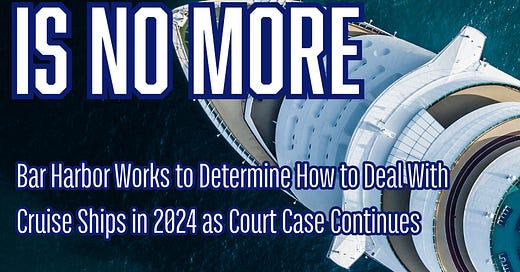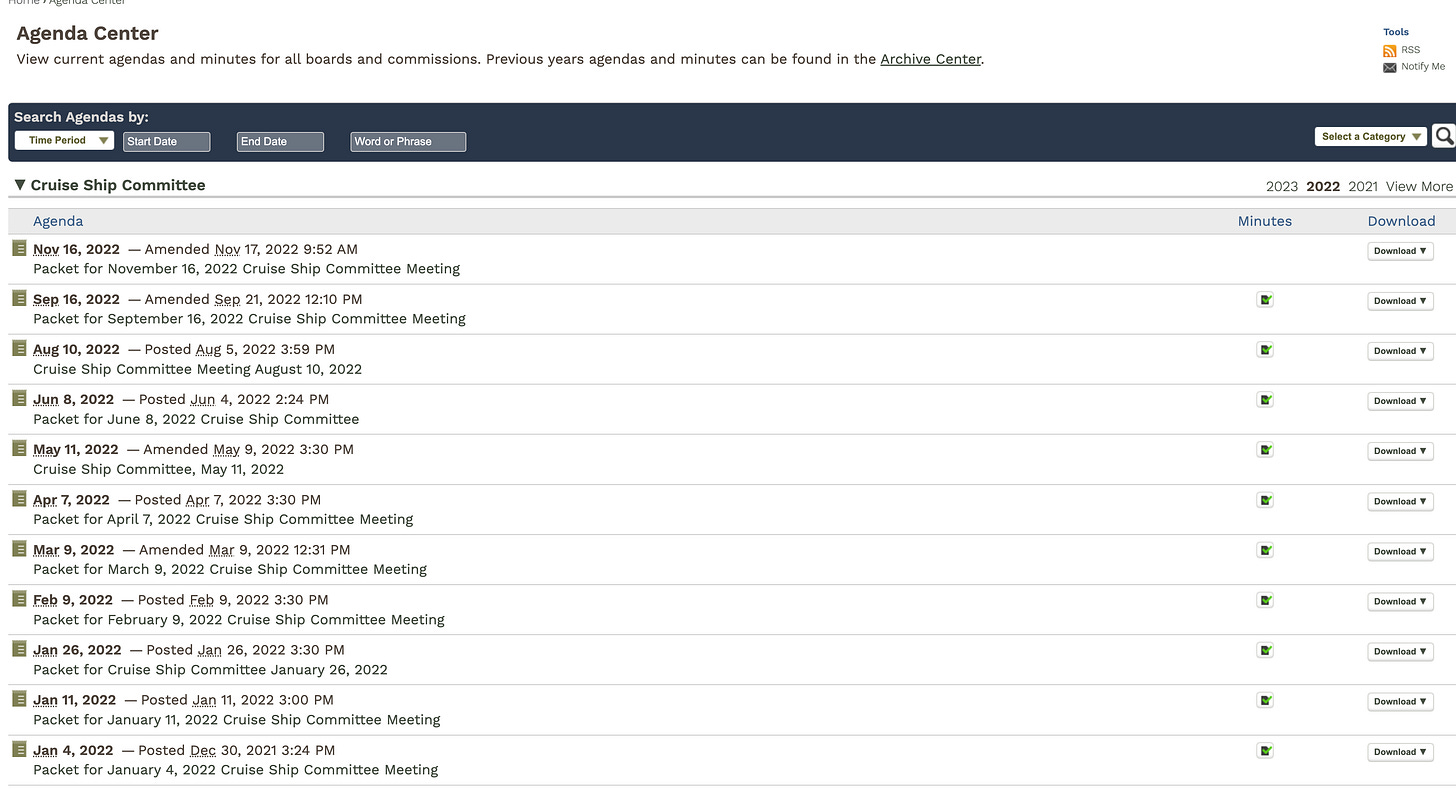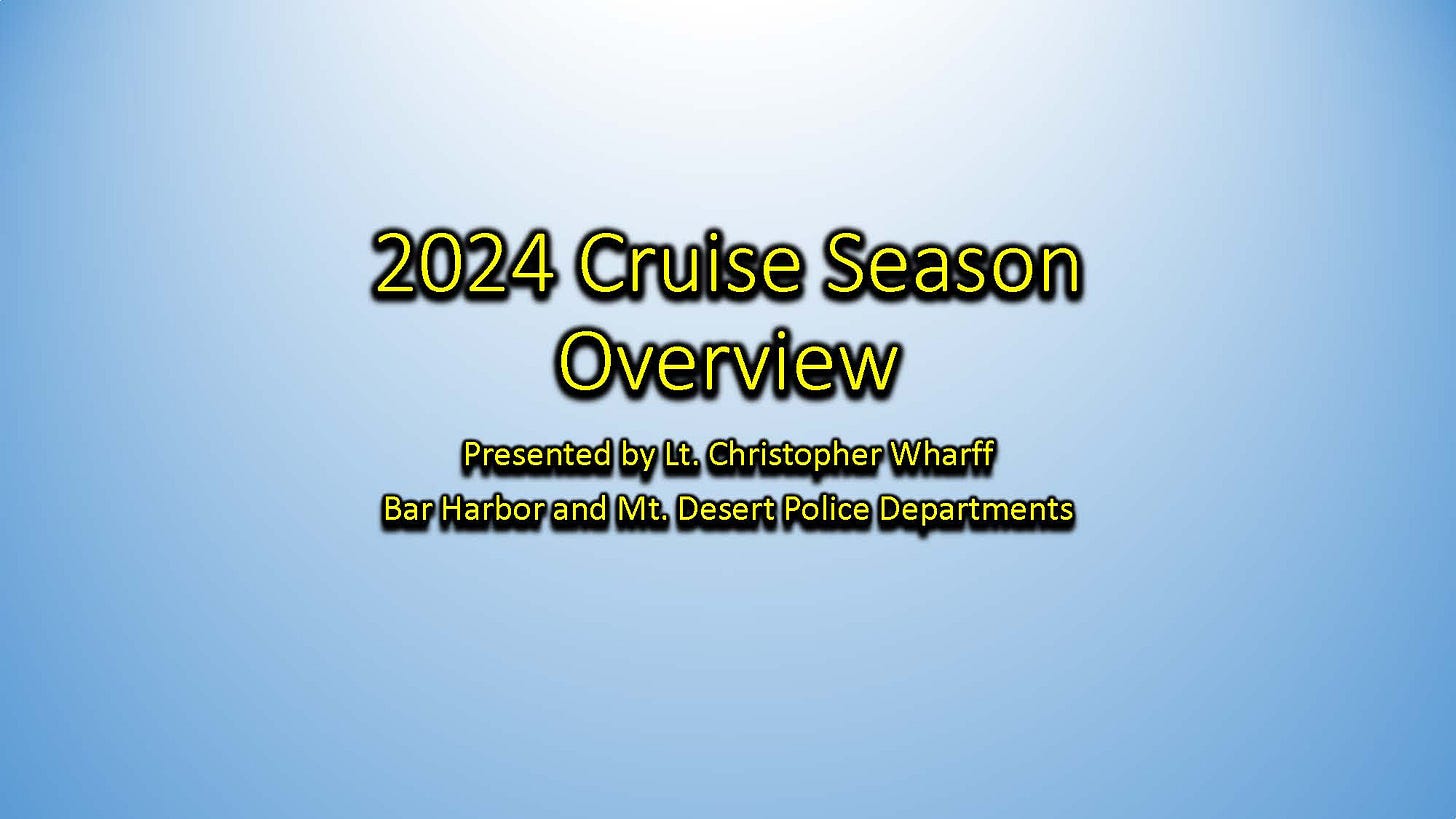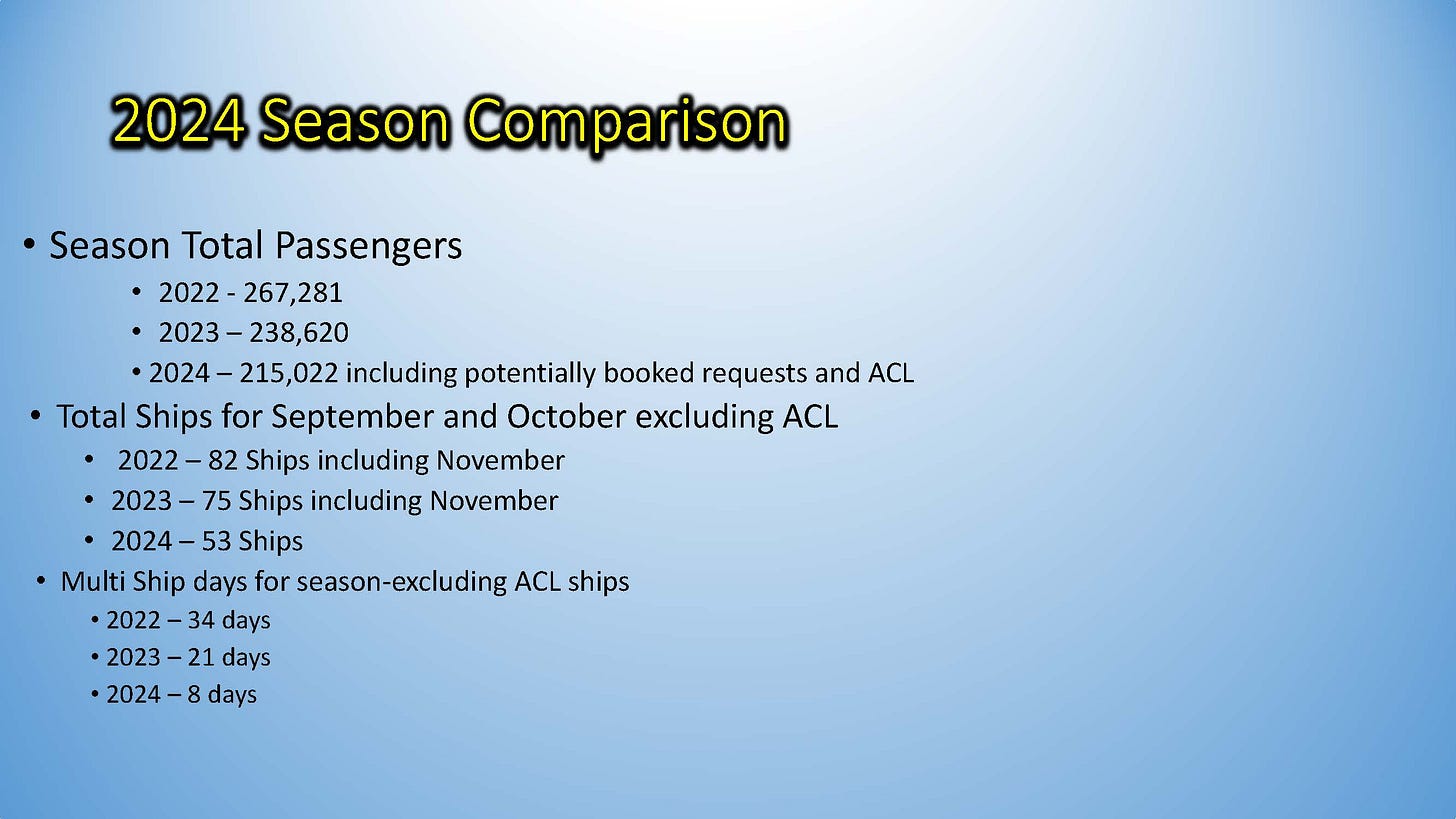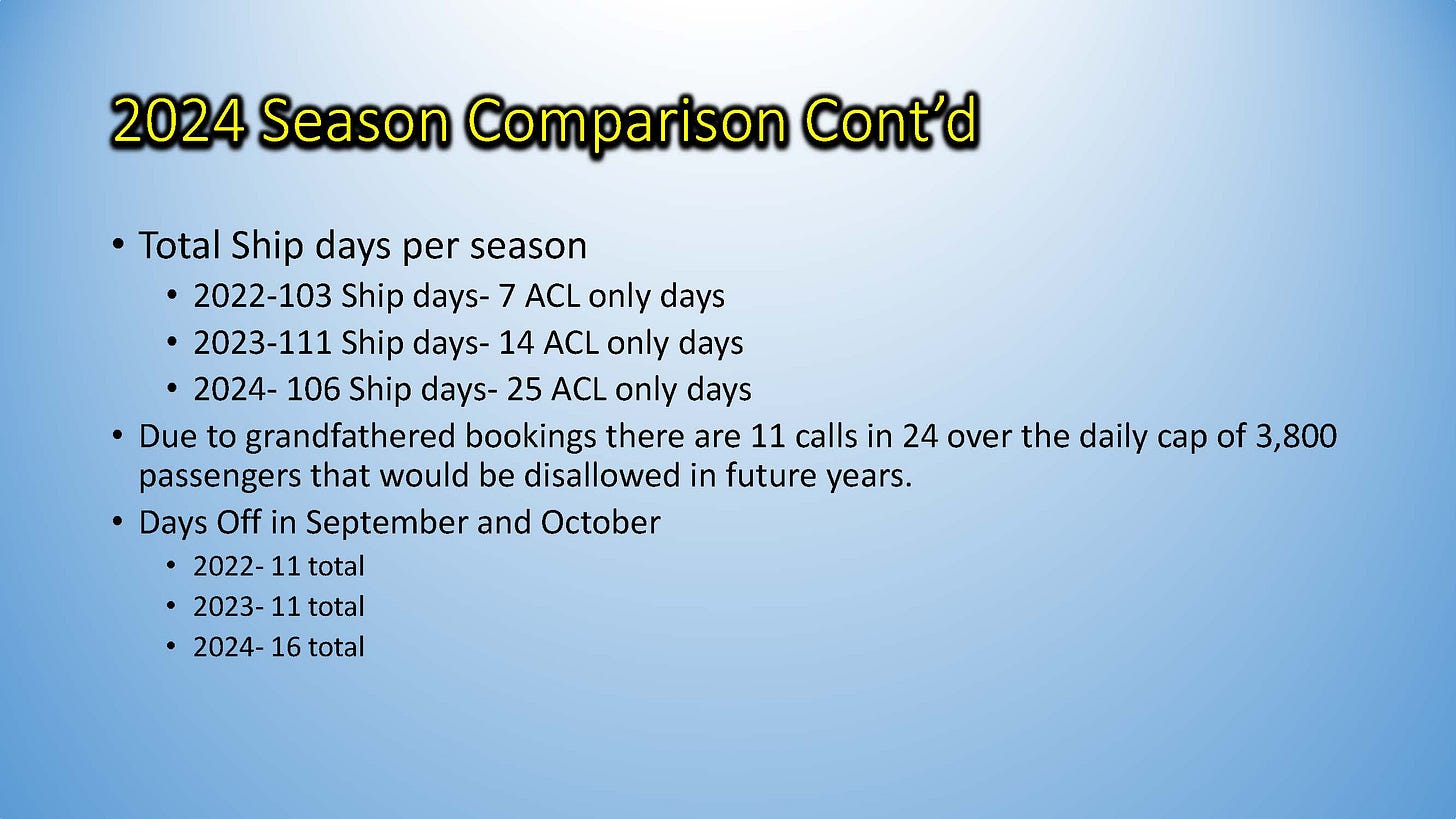Cruise Ship Committee Is No More
Bar Harbor Tries to Determine How to Deal With Cruise Ships in 2024 as Court Case Continues
BAR HARBOR—After a public hearing, the Town Council unanimously disbanded the Cruise Ship Committee last night during its regular Town Council meeting, putting an end to the advisory committee, which is meant to make recommendations to the Town Council on cruise ship practice and policy in town. Councilor Joe Minutolo was not at the meeting.
The committee was asked not to meet earlier this year after a lawsuit about cruise ship disembarkations. The lawsuit involves the company of one of the committee’s members, Eben Salvatore, who works at Ocean Properties. Salvatore is also a member of the Association to Protect People’s Livelihoods (APPLL), a nonprofit that is the lawsuit’s main party. The federal lawsuit occurred after a citizens’ petition changed the number of daily disembarkations to 1,000, imposed a fine for more than that, and put those changes into the town’s land use ordinance. Because of the lawsuit, those changes have not been put into effect.
The advisory committee required 17 members and specified that its members would be:
1. One Town Councilor
2. Harbormaster
3. Deputy Clerk (not currently listed on members list)
4. Police Chief
5. Maritime industry representative
6. Two downtown business representatives
7. Two residents at large
8. One Bar Harbor Chamber of Commerce representative
9. One representative from Cruise Maine
10. One member with “working knowledge of the cruise ship industry in the State of Maine”
11. One shore excursion company (that works with cruise ships) representative
12. One taxi tour industry (that works with cruise ships) representative
13. One representative of an entity that receives cruise ship tenders
14. One representative of the scientific community (currently vacant)
15. One Acadia National Park representative
During the hearing, Salvatore said that the committee has existed since the early 2000s as a private committee of people who were involved with the cruise ship industry or who wanted to promote that aspect of tourism. Eventually, the Bar Harbor Chamber of Commerce was involved. And after that, the town took over the committee.
“All you’re going to do is take the public process out of it,” he said. “The signal that your sending is received by quite a few.” He asked that the Council start respecting the volunteers on their boards and committees in town.
The Age Friendly Committee has also spoken at its public meetings about disbanding. During the Town Council meeting Council Chair Valerie Peacock said the council has received an email from a committee about disbanding, but did not specify the committee. She also said there are several openings on several committees for volunteers. Later, it was suggested the Council discuss the town’s boards and committees more.
Like all the town’s boards and committees, the Cruise Ship Committee was made up of volunteers.
The lead petitioner for the disembarkation changes, Charles Sidman, said he supported disbanding the Cruise Ship Committee as an institutionalized conflict of interest because of its composition. He likened it to the fox running the hen house and said it was inappropriate.
His position was supported by Heather Peterson, who said that Bar Harbor citizens had lost trust in the committee.
“The Cruise Ship Committee is, and always has been, only an advisory committee….I don’t think that constitutes a fox managing a hen house,” Steve Coston said.
The Chamber’s Executive Director Everal Eaton said the Chamber wanted to support the committee being replaced with a tourism management committee that would take an overall look at tourism. The establishment of a tourism plan would put Bar Harbor in line with other communities across the country, he said.
Anna Durand said Salvatore made a good point that all the committees are volunteer and she appreciated the jobs that they had done. She said she remembered 19 years ago when the Queen Mary came Bar Harbor had closed the streets and had a party.
“It was a totally different time in cruise amounts and effort with the town,” she said.
“The people who have to manage the situation still have to manage it,” she said of the cruise ship visitation. She suggested a task force of the harbormaster, a fisherman, a representative of public safety who could also get public input. The goals of Amy Powers (founder of MaineCruisePro) or Sarah Flink (executive of CruiseMaine, part of the Maine Office of Tourism), who are on the committee representing the cruise industry and Cruise Maine, have goals that are not the town’s goals necessarily, she said.
Because Councilor Matthew Hochman was on vacation, he attended via Zoom. Jim O’Connell also attended online and said he was in favor of sustainable tourism. “We really don’t need a cruise ship committee.”
He said that the committee didn’t keep minutes, record meetings, or video them. They are not alone in that. Most town committees do not record their meetings. The last two Cruise Ship Committee meetings do not have minutes uploaded onto the town website. However, minutes are uploaded for the meetings prior to that.
Dessa Dancy thanked the council for taking the first step in a situation that she saw was detrimental to the town. Dancy said the town’s Code of Ethics makes the committee an unworkable situation.
Dancy expressed dismay that several tendering possibilities were not followed up with. One of those possibilities was tendering cruise ships at the town-owned ferry terminal, which is currently in need of repairs on the side where the CAT Ferry does not operate out of. She said that the committee didn’t follow through with public tendering possibilities. This, she said, means that the town can’t collect landing fees, which it would if cruise ship passengers had tendered town properties.
“Instead,” she said, “all landing fees went to a business being represented by a member of the tendering of the cruise ship committee.”
Hochman said that as the council rep to the committee he understood the ill will toward the committee. However, “a lot of the stuff this committee is accused of” did not happen, he said.
The committee, he said, was advisory. It hadn’t raised the passenger caps. It hadn’t raised the number of ships coming in.
The ferry terminal is a great place to tender ships, he said, but it’s not ready to do so now. “I really feel that members of this committee are unjustly vilified for being on the committee. It’s not all rah-rah cruise ships.”
“I do believe and have for a while that the committee, if it were left in place, needs more citizen representation.” He thanked all the members for the work that they’d done over the years. “I hate to see people vilified for doing the job that was asked of them.”
Councilor Maya Caines said that the issue is the committee’s perception by a majority of the public, which is that it is seen as corrupt. “I don’t think that we can just say, ‘Well, they’re not all bad and they are trying their hardest.’” She said they need to take a step forward and look at in a more holistic way at tourism management.
Councilor Kyle Shank said that as a practical matter there will be less public input into the process now that the committee is disbanding. In the future, he suggested the town be more mindful when creating committees and specific in the committee’s goals and membership.
Peacock said that the public participation will continue, but will instead be about how many cruise ships come to town and what that looks like as policy in the town via public hearing and comments at the Council level and other committees. She said that the Cruise Ship Committee managed the standard of procedures (such as how to get a ship into town, anchorages, and how to move around the ships and passengers).
“Obviously there was contention,” Peacock said. She said there are now different tools in front of the town and Council that require different management approaches and that they should revisit the public participation aspect of the Cruise Ship Committee and look more holistically at the tourism process.
The committee had two times for public comment at each of its meetings.
Hochman stressed that they shouldn’t let a tourism management committee fall off the radar.
“I think the committee made perfect sense in the beginning,” Brechlin said that the committee’s focus on procedure shifted to policy later on. “Then people got the perception, correctly I think in many instances, that the committee was operating at cross purposes to what the community wanted.”
Brechlin was also in favor of a larger tourism committee. “I don’t think cruise ships is the great Satan in overcrowding or in too much activity in Bar Harbor or taking too much resources” he said, but it’s a part of the bigger picture that the town has to look at all at the same time.
CRUISE SHIPS AND COURT CASES AND MOAS, OH, MY.
Town Council Chair Valerie Peacock explained during the meeting that while the federal case against the town’s cruise ship limits is in court, the town is running two parallel threads as it tries to determine how to deal with upcoming seasons in two different scenarios.
In the first scenario, the changes are upheld and the town wins the lawsuit. That would mean that the disembarkation rules limiting cruise ship disembarkations to 1000 or less a day (without fines) are upheld or partially upheld. Those plans have been discussed in executive sessions because of the litigation, but they expect a draft to be made public in October. Town Attorney Stephen Wagner said it will be a stand-alone ordinance and include updates to the Harbor chapter of the land use ordinance as well as updates to standard operating procedures.
In the second scenario, the town loses the case and the changes are not upheld. If that occurs, the town would continue with the new memorandums of agreement (MOAs) that the town began in 2022. Those MOAs also limited cruise ship visitation, but were not based on passenger disembarkations.
The memorandums of agreement are the town’s agreements with cruise lines about when they can visit and other details. These documents are currently being used as the town waits for the federal court decision.
According to a recent stipulation filing in APPLL vs Town of Bar Harbor,
“On August 16, 2022, the Town Council initially approved a memorandum of agreement (“MOA”) plan by a 5-2 vote. After several months of discussions and revisions, the MOA was finalized on September 28, 2022. The MOA included a shortened cruise ship season, by eliminating the months of April and November, and lower passenger caps that, in almost all cases, would reduce the number of daily cruise visitors disembarking at Bar Harbor.”
The Council negotiated with the industry for that series of reductions. The cruise ship disembarkation rules then happened quickly afterwards, passed by voters in November 2022.
The current MOAs expire at the end of December and have to be renegotiated, Peacock said.
The town hasn’t yet taken new reservations for the 2025 season. Last time the MOAs were negotiated by two councilors, Harbormaster Chris Wharff, and a representative of Cruise Maine. This time it will be Peacock, Minutolo, Finance Director Sarah Gilbert, Wharff, and Town Attorney Stephen Wagner as the working group. Anything that comes out of the group would come back to the Council for votes.
Originally Flink was presented as part of the working group, Peacock said, but would not be part of determining the numbers, but as a representative of the state tourism office.
Friedmann stressed that Flink was an advocate for the cruise lines. Caines shared Friedmann’s concerns.
Peacock said that they’d already had the conversation about who would be on the committee. This conversation has not previously occurred in public. She stressed that Flink was helpful and knowledgeable about the cruise industry and how it works. The Council unanimously approved the working group without Flink.
2024 SEASON UPDATE
Harbormaster Chris Wharff presented the numbers that have occurred and could potentially occur if the MOA plan continues to exist for the 2024 and 2025 seasons.
The reservations in his presentation were not all booked. Instead, it showed what future cruise ship seasons would look like if the requests that have come in are confirmed.
September 2023 is fuller because of the grandfathered bookings, he said.
The cruise-ship-free days in September 2024 are a reflection of the work of the MOAs. The September 2024 numbers are theoretical with the bookings for requested ships that are under the 6,000 passenger cap. The numbers do not include American Cruise Line ships, which are smaller.
“Cruise ships can cancel us but we can’t cancel them,” Darcy said.
“That’s the cancel culture in Bar Harbor,” Friedmann said.
LINKS TO LEARN MORE
Cruise Ship Enabling Ordinance
This story has been updated. We wrote "a representative of CLIA." It should have said "a representative of CruiseMaine." We are so sorry for the error.


